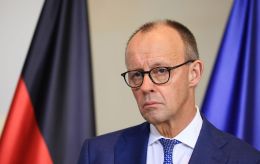Germany prepares for drone attacks: Launching a national defense center
 Illustrative photo: Germany launches a drone defense center (Getty Images)
Illustrative photo: Germany launches a drone defense center (Getty Images)
In Germany, a national drone defense center is planned to be launched by mid-December. The new structure is being created against the backdrop of a rise in hybrid attacks and the appearance of drones over critical infrastructure facilities, according to ntv.
"By mid-December, the national drone defense center is expected to become operational," said Alexander Dobrindt, Federal Ministry of the Interior.
According to him, the creation of the center is part of a more proactive approach to combating the growing number of hybrid attacks on German companies and the country’s infrastructure.
The minister clarified that the new structure will combine the expertise of the Federal Police, the Federal Criminal Police Office, and the state police forces in countering drones.
Regarding the origin of the drones flying over critical infrastructure, the interior minister also made a statement.
"We have indications that some of the observed drones come from the Russian shadow fleet," he explained.
According to Dobrindt, Germany is undergoing a "stress test to see whether the state can withstand external threats."
Drones over EU countries
In 2025, Germany recorded a significant increase in cases of unauthorized drone use.
According to The Wall Street Journal, more than a thousand incidents have been registered since the beginning of the year.
Recently, several European countries have reported drone activity near airports. In Brussels and Liège, in particular, their appearance caused serious disruptions to air traffic.
Belgian Army Chief of Staff Frédéric Vansina ordered the military to shoot down suspicious drones, but only when doing so does not pose a risk to people or infrastructure.
Similar incidents have occurred in Sweden, where airports were temporarily suspended due to drones.
In Germany, authorities suggest that the increase in drone activity may be linked to discussions about using frozen Russian assets in the Belgian financial institution Euroclear to provide financial aid to Ukraine.

